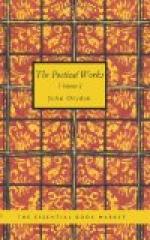In equal balances were justly cast:
But this new Jehu spurs the hot-mouth’d horse—
Instructs the beast to know his native force; 120
To take the bit between his teeth, and fly
To the next headlong steep of anarchy.
Too happy England, if our good we knew,
Would we possess the freedom we pursue!
The lavish government can give no more:
Yet we repine, and plenty makes us poor.
God tried us once; our rebel-fathers fought,
He glutted them with all the power they sought:
Till, master’d by their own usurping brave,
The free-born subject sunk into a slave. 130
We loathe our manna, and we long for quails;
Ah, what is man when his own wish prevails!
How rash, how swift to plunge himself in ill!
Proud of his power, and boundless in his will!
That kings can do no wrong, we must believe;
None can they do, and must they all receive?
Help, Heaven! or sadly we shall see an hour,
When neither wrong nor right are in their power!
Already they have lost their best defence—
The benefit of laws which they dispense. 140
No justice to their righteous cause allow’d;
But baffled by an arbitrary crowd.
And medals graved their conquest to record,
The stamp and coin of their adopted lord.
The man[83] who laugh’d but
once, to see an ass
Mumbling make the cross-grain’d
thistles pass,
Might laugh again to see a jury chaw
The prickles of unpalatable law.
The witnesses, that leech-like lived on
blood,
Sucking for them was medicinally good;
150
But when they fasten’d on their
fester’d sore,
Then justice and religion they forswore,
Their maiden oaths debauch’d into
a whore.
Thus men are raised by factions, and decried;
And rogue and saint distinguish’d
by their side.
They rack even Scripture to confess their
cause,
And plead a call to preach in spite of
laws.
But that’s no news to the poor injured
page;
It has been used as ill in every age,
And is constrain’d with patience
all to take: 160
For what defence can Greek and Hebrew
make?
Happy who can this talking trumpet seize;
They make it speak whatever sense they
please:
’Twas framed at first our oracle
to inquire;
But since our sects in prophecy grow higher,
The text inspires not them, but they the
text inspire.
London, thou great emporium of our
isle,
O thou too bounteous, thou too fruitful
Nile!
How shall I praise or curse to thy desert?
Or separate thy sound from thy corrupted
part? 170
I call thee Nile; the parallel will stand;
Thy tides of wealth o’erflow the
fatten’d land;
Yet monsters from thy large increase we




